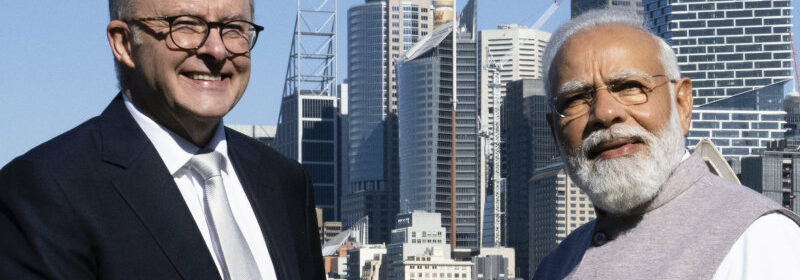Democratic backsliding: It’s not Albanese’s job to cancel Modi

Save articles for later
Add articles to your saved list and come back to them any time.
Anthony Albanese received a free crash course on Indian politics when he appeared on breakfast television on Wednesday, fresh from his rally the night before with Indian Prime Minister Narendra Modi.
Appearing before a crowd of around 20,000 Modi devotees at Sydney Olympic Park, Albanese heaped praise on his counterpart, dubbing him “the boss” because he had apparently attracted a bigger crowd to the arena than rock star Bruce Springsteen.
Prime Minister Anthony Albanese and Indian Prime Minister Narendra Modi on Wednesday.Credit: Janie Barrett
Having done some reading on Modi, the host of Sunrise was less complimentary.
“He’s sort of reduced press freedoms, he discriminates against minorities, he’s accused of watering down democracy,” David Koch asked. “He’s sort of, he seems a bit of a tyrant?”
Kochie wasn’t alone in feeling uncomfortable at the Albo-Modi bromance. Human rights advocates, the Greens and Indian Muslim diaspora groups urged Albanese to lobby Modi to improve India’s record on the treatment of minorities and press freedom. Some called for the government to sanction members of Modi’s Bharatiya Janata Party for a 2019 crackdown on protesters in northern India.
Albanese rejected these calls, saying it is not up to him to pass public comment “on some of the internal politics in India which, as a democracy, has a range of views”.
Such circumspection reflects the harsh reality of being in power. While foreign policy requires a delicate balancing of principle and pragmatism, Albanese’s primary job is to advance Australia’s national interests, not to “call out” his fellow world leaders for their failings.
It’s in Australia’s interest for Albanese to have a good relationship with Modi given the latter leads the world’s most populous country, a rising economic powerhouse that serves as an important counterweight to China’s rapid rise.
The art of diplomacy is to find common ground with nations that are not identical to your own. This doesn’t mean abandoning your own values. It does require realism about your ability to shape the world around you and a strategy to achieve your goals. World leaders don’t like being lectured by their counterparts, and doing so can undermine important relationships for no gain.
As Foreign Minister Penny Wong has acknowledged: “We live in a region of the world where most people don’t share our views and values.” If Modi is a tyrant, then so are the overwhelming majority of leaders in the world and the Asia-Pacific.
An Indian Muslim boy holds a placard during a protest against the Citizenship Amendment Bill.Credit: AP
There are several disturbing trends in India, flaws often overlooked by Modi’s boosters. Modi rose to power as a champion of Hindu nationalism and has pursued policies that have marginalised the nation’s 200 million Muslim minority.
A 2019 law sparked global criticism by providing an accelerated pathway to citizenship for Hindus, Sikhs, Buddhists and other religious minorities from nearby countries but excluding Muslims. In the same year, Modi diminished the power of India’s only Muslim-majority state by splitting it into two and stripping it of its special constitutional autonomy.
The Indian government’s decision to block social media access to a critical BBC documentary on Modi before raiding the BBC’s Indian offices for supposed tax irregularities was a blow to media freedom.
Since Modi came to power in 2014, India has fallen from 27th to 46th in The Economist’s global democracy index and is classified as a “flawed democracy”. That puts it in the same category as Indonesia, Thailand, Singapore, Malaysia, the Philippines, Brazil, Greece and Italy. Just 23 nation states are classed as full democracies, making Australia a member of an exclusive club.
Modi mania officially hit Sydney on Tuesday night.Credit: James Brickwood
Indian elections are still applauded for being free and fair, putting it in an altogether different category from an authoritarian state such as China (ranked 156th out of 167 nations in The Economist’s democracy index).
And while Modi’s unwillingness to condemn Russia’s invasion of Ukraine is unfortunate, it shouldn’t come as a surprise. India was a leader of the non-aligned movement during the Cold War and has been reliant on Russian weapons supplies since the 1950s.
No one should be shocked that India’s worldview remains different to Australia’s in important ways, even as a mutual distrust of China and shared economic opportunities bring the nations closer together.
Neither a tyrant nor a saint, Modi is extremely popular in India and looks set to be in power for many years to come. It’s Albanese’s job to make the relationship work while it’s the role of a civil society to call out any democratic backsliding.
Cut through the noise of federal politics with news, views and expert analysis from Jacqueline Maley. Subscribers can sign up to our weekly Inside Politics newsletter here.
Most Viewed in Politics
From our partners
Source: Read Full Article


